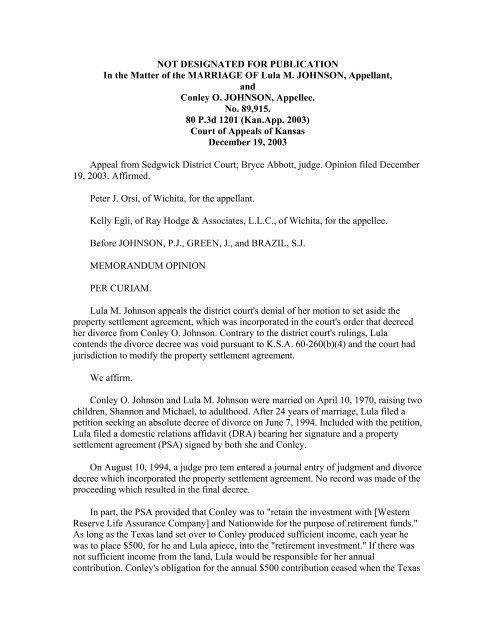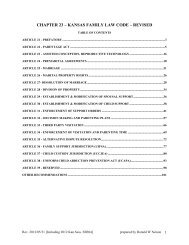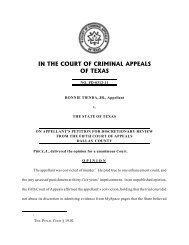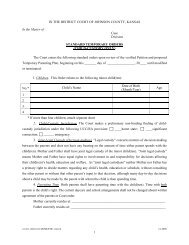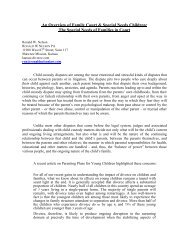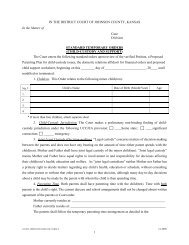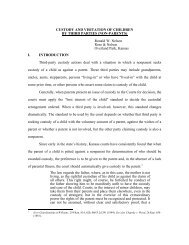NOT DESIGNATED FOR PUBLICATION In the ... - Kansas divorce
NOT DESIGNATED FOR PUBLICATION In the ... - Kansas divorce
NOT DESIGNATED FOR PUBLICATION In the ... - Kansas divorce
Create successful ePaper yourself
Turn your PDF publications into a flip-book with our unique Google optimized e-Paper software.
<strong>NOT</strong> <strong>DESIGNATED</strong> <strong>FOR</strong> <strong>PUBLICATION</strong><strong>In</strong> <strong>the</strong> Matter of <strong>the</strong> MARRIAGE OF Lula M. JOHNSON, Appellant,andConley O. JOHNSON, Appellee.No. 89,915.80 P.3d 1201 (Kan.App. 2003)Court of Appeals of <strong>Kansas</strong>December 19, 2003Appeal from Sedgwick District Court; Bryce Abbott, judge. Opinion filed December19, 2003. Affirmed.Peter J. Orsi, of Wichita, for <strong>the</strong> appellant.Kelly Egli, of Ray Hodge & Associates, L.L.C., of Wichita, for <strong>the</strong> appellee.Before JOHNSON, P.J., GREEN, J., and BRAZIL, S.J.MEMORANDUM OPINIONPER CURIAM.Lula M. Johnson appeals <strong>the</strong> district court's denial of her motion to set aside <strong>the</strong>property settlement agreement, which was incorporated in <strong>the</strong> court's order that decreedher <strong>divorce</strong> from Conley O. Johnson. Contrary to <strong>the</strong> district court's rulings, Lulacontends <strong>the</strong> <strong>divorce</strong> decree was void pursuant to K.S.A. 60-260(b)(4) and <strong>the</strong> court hadjurisdiction to modify <strong>the</strong> property settlement agreement.We affirm.Conley O. Johnson and Lula M. Johnson were married on April 10, 1970, raising twochildren, Shannon and Michael, to adulthood. After 24 years of marriage, Lula filed apetition seeking an absolute decree of <strong>divorce</strong> on June 7, 1994. <strong>In</strong>cluded with <strong>the</strong> petition,Lula filed a domestic relations affidavit (DRA) bearing her signature and a propertysettlement agreement (PSA) signed by both she and Conley.On August 10, 1994, a judge pro tem entered a journal entry of judgment and <strong>divorce</strong>decree which incorporated <strong>the</strong> property settlement agreement. No record was made of <strong>the</strong>proceeding which resulted in <strong>the</strong> final decree.<strong>In</strong> part, <strong>the</strong> PSA provided that Conley was to "retain <strong>the</strong> investment with [WesternReserve Life Assurance Company] and Nationwide for <strong>the</strong> purpose of retirement funds."As long as <strong>the</strong> Texas land set over to Conley produced sufficient income, each year hewas to place $500, for he and Lula apiece, into <strong>the</strong> "retirement investment." If <strong>the</strong>re wasnot sufficient income from <strong>the</strong> land, Lula would be responsible for her annualcontribution. Conley's obligation for <strong>the</strong> annual $500 contribution ceased when <strong>the</strong> Texas
property was sold. When <strong>the</strong> "investment has reached its full potential" or Conleydecided to terminate <strong>the</strong> fund, <strong>the</strong> fund would be divided equally.Lula filed a petition for an accounting in 2001. At <strong>the</strong> hearing, <strong>the</strong> court orderedConley to provide an accounting for <strong>the</strong> $500 per year retirement investment and <strong>the</strong>$500 per year contribution to <strong>the</strong> Western Reserve Life Assurance Company (WRL) andNationwide Life <strong>In</strong>surance (Nationwide), as set forth in <strong>the</strong> PSA.Lula filed a motion to set aside, in part, <strong>the</strong> journal entry of judgment and <strong>the</strong> PSA,pursuant to K.S.A. 60-260(b)(6) and <strong>In</strong> re Marriage of Kirk, 24 Kan.App.2d 31, 941 P.2d385, rev. denied 262 Kan. 961 (1997). Specifically, Lula requested <strong>the</strong> court to set aside<strong>the</strong> specific provisions related to <strong>the</strong> WRL account, <strong>the</strong> Nationwide account, and <strong>the</strong>Texas land, and to make a valid, just, and equitable division of those assets.At <strong>the</strong> hearing, Lula orally added a request for relief pursuant to K.S.A. 60-260(b)(4). Because Conley was in <strong>the</strong> process of selling <strong>the</strong> Texas farmland, <strong>the</strong> courtordered <strong>the</strong> proceeds of <strong>the</strong> sale to be reserved. The court also ordered two annuityaccounts, Nationwide and WRL, to remain intact until <strong>the</strong> court rendered a decision.The judge who presided at <strong>the</strong> 260(b) hearing, filed a letter opinion denying relief toLula and instructing Conley's attorney to draft a journal entry.Eventually, a journal entry was signed by a different judge. It stated <strong>the</strong> PSA did notcontain any facts or o<strong>the</strong>r criteria from which <strong>the</strong> trial court could have discerned <strong>the</strong>agreement provided for a fair, just, and equitable division of <strong>the</strong> parties' assets andliabilities. The court pointed out <strong>the</strong> ambiguities surrounding <strong>the</strong> provisions for <strong>the</strong>retirement account and <strong>the</strong> WRL and Nationwide accounts. However, after setting forth<strong>the</strong> many failings of <strong>the</strong> PSA, <strong>the</strong> district court found it was not void ab inito. Fur<strong>the</strong>r, <strong>the</strong>district court found Lula waited an unreasonable time to file her 260(b) motion; thus, itdid not have jurisdiction to grant her motion and modify <strong>the</strong> parties' PSA.THE DIVORCE DECREEDuring oral arguments on Lula's 60-260(b) motion, her counsel argued that she wasentitled to relief under K.S.A. 60-260(b)(4), as <strong>the</strong> decree, incorporating <strong>the</strong> agreement,was void. Lula maintains in her brief that when <strong>the</strong> <strong>divorce</strong> was granted and <strong>the</strong> PSAapproved, <strong>the</strong> pro tern judge's failure to "perform his judicial duty" and to find, pursuantto K.S.A.2002 Supp. 60-1610(b)(3), that <strong>the</strong> agreement was valid, just, and equitabledeprived her of due process of law, rendering <strong>the</strong> judgment void.K.S.A. 60-260(b) provides a means for <strong>the</strong> district court to set aside a PSA and orderan equitable division of property. Richardson v. Richardson, 3 Kan.App.2d 610, 612, 599P.2d 320, rev. denied 226 Kan. 792 (1979). Relief is available under 260(b) where factsexisting at <strong>the</strong> time of <strong>the</strong> <strong>divorce</strong> decree, if known to <strong>the</strong> court, would have brought adifferent result. <strong>In</strong> re Marriage of Hunt, 10 Kan.App.2d 254, 1, 697 P.2d 80 (1985).
<strong>In</strong> pertinent part, K.S.A. 60-260(b) allows a party to move a court to relieve it from afinal judgment, order, or proceeding due to: "(1) mistake, inadvertence, surprise, orexcusable neglect;" "(2) newly discovered evidence;" "(3) fraud;" (4) a void judgment; ...or "(6) any o<strong>the</strong>r reason justifying relief from <strong>the</strong> operation of <strong>the</strong> judgment." The motionshall be made within a reasonable time, and for reasons (1), (2) and (3) not more than oneyear after judgment." K.S.A. 60-260(b).Ordinarily, a ruling on a motion for relief from a final judgment, filed pursuant toK.S.A. 60-260(b), rests within <strong>the</strong> sound discretion of <strong>the</strong> district court and will not bereversed absent a showing of abuse of discretion. <strong>In</strong> re Marriage of Hampshire, 261 Kan.854, 862, 934 P.2d 58 (1997).K.S.A.2001 Supp. 60-1610(b)(3) provides that "[i]f <strong>the</strong> parties have entered into aseparation agreement which this court finds to be valid, just and equitable, <strong>the</strong> agreementshall be incorporated in <strong>the</strong> decree." This provision "requires a district court to scrutinizea separation agreement before approving it. Such scrutiny includes a requirement that <strong>the</strong>district court review evidence in <strong>the</strong> record sufficient to support <strong>the</strong> finding that <strong>the</strong>separation agreement is valid, just, and equitable." <strong>In</strong> re Marriage of Kirk, 24Kan.App.2d 31, 36, 941 P.2d 385, rev. denied 262 Kan. 961 (1997). Mere agreement by<strong>the</strong> parties does not vitiate <strong>the</strong> court's duty to scrutinize <strong>the</strong> agreement. If <strong>the</strong> agreement isnot valid, just, and equitable, <strong>the</strong> court should reject or alter it. Disclosure of pertinentfinancial information of <strong>the</strong> parties is integral to <strong>the</strong> court's duty in carefully reviewing<strong>the</strong> agreement to ascertain if it is fair, just, and equitable.Lula fur<strong>the</strong>r contends on appeal that 60-1610(b)(3) requires <strong>the</strong> court to carefullyscrutinize <strong>the</strong> PSA to guard against approving an agreement that is procured under fraudor oppression. Notably, Lula's claim seeking relief from <strong>the</strong> PSA due to fraud would beproperly made under K.S.A. 60-260(b)(3), not K.S.A. 60-260(b)(6). Accordingly, herclaim would be barred as <strong>the</strong> statute requires that a motion made for reason of fraud mustbe brought within 1 year after <strong>the</strong> judgment was taken. See K.S.A. 60-260(b).<strong>In</strong> his letter opinion, <strong>the</strong> district judge stated, "There are serious allegations in thiscase that suggest that <strong>the</strong> [PSA] may have been secured by oppression." He went on tomake <strong>the</strong> factual finding that, because Lula's primary interest at <strong>the</strong> time of <strong>the</strong> <strong>divorce</strong>was to give Conley what he wanted and to escape <strong>the</strong> marriage, that a hearing on <strong>the</strong>terms and conditions of <strong>the</strong> <strong>divorce</strong>, or an affidavit or answers to interrogatories wouldnot have produced a different result. See <strong>In</strong> re Marriage of Hunt, 10 Kan.App.2d 254,Syl. 1, 697 P.2d 80. Lula's conduct as <strong>the</strong> petitioner, who retained <strong>the</strong> parties' soleattorney, and voluntarily signed <strong>the</strong> petition, DRA, and <strong>the</strong> separation agreement, as wellas statements in Lula's affidavit, support <strong>the</strong> district court's finding.Lula suggests that <strong>In</strong> re Marriage of Kirk, 24 Kan.App.2d 31, 941 P.2d 385, isdirectly on point. <strong>In</strong> Kirk, <strong>the</strong> trial judge approved <strong>the</strong> settlement agreement whichawarded each party <strong>the</strong>ir individual business interests, <strong>the</strong> husband his excavatingservice, and <strong>the</strong> wife her Mary Kay business, without first reviewing any evidence ofvalue for <strong>the</strong> businesses. <strong>In</strong> <strong>the</strong> absence of both parties, <strong>the</strong> settlement agreement was
submitted by an attorney to <strong>the</strong> district court for approval. The attorney signed <strong>the</strong><strong>divorce</strong> decree, without indicating that he represented ei<strong>the</strong>r party. The district court laterdenied <strong>the</strong> wife's petition to set aside <strong>the</strong> <strong>divorce</strong> decree, rejecting <strong>the</strong> wife's argument <strong>the</strong>record lacked sufficient documentation from which <strong>the</strong> judge could have determined <strong>the</strong>validity and justness of <strong>the</strong> separation agreement. We reversed, finding <strong>the</strong> district courthad not followed <strong>the</strong> guidance of K.S.A.2002 Supp. 60-1610(b)(3). 24 Kan.App.2d at 37,941 P.2d 385.Here, significant assets were omitted from Lula's DRA and <strong>the</strong> district court found<strong>the</strong> PSA "does not contain any facts of o<strong>the</strong>r criteria on which <strong>the</strong> Court could decide thatit provided for a fair, just and equitable division of <strong>the</strong> parties assets and liabilities."Without any supporting evidence of asset valuation, <strong>the</strong> trial judge never<strong>the</strong>less awarded<strong>the</strong> property in <strong>the</strong> PSA. Kirk would support finding that Lula's motion should be grantedas <strong>the</strong> trial judge failed to review <strong>the</strong> PSA as required by K.S.A.2002 Supp. 60-1610(b)(3). See 24 Kan.App.2d at 37, 941 P.2d 385 (<strong>the</strong> record lacked evidence ordocumentation necessary to determine whe<strong>the</strong>r <strong>the</strong> agreement was fair, just, andequitable).The Kirk court fur<strong>the</strong>r explained <strong>the</strong> absence of evidence to support a finding that <strong>the</strong>agreement is just and equitable constitutes "more than a technical defect." 24 Kan.App.2dat 35, 941 P.2d 385. Although a court has broad discretion in adjusting property rights,none<strong>the</strong>less, "[a]ction inconsistent with <strong>the</strong> limitations of judicial discretion amounts tomore than a 'technical defect." ' 24 Kan.App.2d at 36, 941 P.2d 385.Notably, <strong>the</strong> motion to set aside in Kirk was filed in less than 1 year, and <strong>the</strong> delay infiling was not raised as an issue. Conversely, Lula waited over 7 years to file her motionand Conley has raised Lula's delay in his defense.However, if Lula is correct that <strong>the</strong> original court's judgment is void, her failure tochallenge <strong>the</strong> judgment for more than 7 years does not prevent her from obtaining reliefunder 60-260(b)(4), as noted by <strong>the</strong> district court. Notwithstanding <strong>the</strong> language of 60-260(b), a void judgment is a nullity and may be vacated at any time. <strong>In</strong> re Marriage ofHampshire, 261 Kan. at 862, 934 P.2d 58.A judgment is void "only if <strong>the</strong> court that rendered it lacked jurisdiction of <strong>the</strong>subject matter or of <strong>the</strong> parties or if <strong>the</strong> court acted in a manner inconsistent with dueprocess. [Citations omitted.]" <strong>In</strong> re Marriage of Cline, 17 Kan.App.2d 230, 233, 840 P.2d1198 (1992). A court acts in a manner inconsistent with due process when fundamentalprocedural requirements are not satisfied, such as notice and opportunity to be heard. SeeState v. Wilkinson, 269 Kan. 603, 608, 9 P.3d 1 (2000).Lula does not argue that <strong>the</strong> district court lacked subject matter or personaljurisdiction. While Kirk suggests that a court's failure to abide by K.S.A. 60-1610(b)(3)and find a separation agreement to be valid, just, and equitable constitutes more thantechnical defect, or irregularity in <strong>the</strong> judgment, it does not indicate <strong>the</strong> instant judgmentis void because it violated Lula's right to due process. See Cline, 17 Kan.App.2d at 233,
840 P.2d 1198. Lula does not claim that she did not have knowledge of or opportunity toappear at any stage of <strong>the</strong> proceeding; in fact, she was <strong>the</strong> petitioner. She signed and filedall of <strong>the</strong> necessary documents, and <strong>the</strong> sole attorney represented her.<strong>In</strong> summary, <strong>the</strong> district court did not abuse its discretion in ruling that K.S.A. 60-260(b)(4) did not provide adequate grounds to set aside <strong>the</strong> <strong>divorce</strong> decree. Substantialcompetent evidence supports <strong>the</strong> district court's finding <strong>the</strong> <strong>divorce</strong> court had personaland subject matter jurisdiction over <strong>the</strong> parties and that <strong>the</strong> court did not act in a mannerinconsistent with due process.THE PSALula contends in her brief that should this court agree <strong>the</strong> <strong>divorce</strong> decree whichincorporated <strong>the</strong> PSA is valid, we should none<strong>the</strong>less remand <strong>the</strong> PSA for interpretationand clarification of those provisions "pertaining to <strong>the</strong> division of debts, contribution toretirement accounts and management of <strong>the</strong> WRL and Nationwide funds."Lula filed her motion to set aside <strong>the</strong> journal entry of judgment and PSA 7 yearsafter <strong>the</strong> <strong>divorce</strong> decree was filed. After finding <strong>the</strong> journal entry and decree of <strong>divorce</strong>were not void ab initio, <strong>the</strong> district court stated it did not have jurisdiction to modify <strong>the</strong>PSA, in spite of its noted deficiencies, because Lula did not file her 260(b) motion withina reasonable time.According to <strong>In</strong> re Marriage of Boldridge, 29 Kan.App.2d 581, 582, 29 P.3d 454,rev. denied 272 Kan. 1418 (2001), this court exercises de novo review of <strong>the</strong> questionwhe<strong>the</strong>r a trial court had jurisdiction to reopen a parties' property division, which waspart of <strong>the</strong> <strong>divorce</strong> decree. <strong>In</strong> Boldridge, <strong>the</strong> movant was unable to produce evidenceestablishing that property, in <strong>the</strong> form of a claim which later led to a substantial award,had been concealed at <strong>the</strong> time <strong>the</strong> <strong>divorce</strong> decree was entered. The court noted that <strong>the</strong>lawsuit was not even contemplated when <strong>the</strong> <strong>divorce</strong> was finalized. 29 Kan.App.2d at581-83, 29 P.3d 454. Based on those facts, <strong>the</strong> Boldridge court stated that "<strong>the</strong> passage of46 months from <strong>the</strong> time <strong>the</strong> <strong>divorce</strong> decree was filed to <strong>the</strong> time <strong>the</strong> motion was filed[was] an unreasonable period of time," leaving <strong>the</strong> court without jurisdiction to reopen a<strong>divorce</strong> decree and modify it. 29 Kan.App.2d at 583, 29 P.3d 454; see also <strong>In</strong> reMarriage of Bowers, 23 Kan.App.2d 641, 645-46, 933 P.2d 176 (1997) (noting that filinga 260[b][6] motion 4 years after <strong>the</strong> <strong>divorce</strong> decree is not a reasonable time absentextenuating circumstances).The Supreme Court has stated that what constitutes a reasonable delay under 60-260(b) "is a question left to <strong>the</strong> discretion of <strong>the</strong> trial court. The determination dependsupon <strong>the</strong> facts of each case, considering <strong>the</strong> interest in finality, <strong>the</strong> reasons for <strong>the</strong> delay,<strong>the</strong> ability of a litigant to learn earlier of <strong>the</strong> grounds relied upon, and any prejudice to <strong>the</strong>parties." <strong>In</strong> re Marriage of Larson, 257 Kan. 456, Syl. 3, 894 P.2d 809 (1995).The district court did not abuse its discretion in determining Lula waited anunreasonable amount of time in filing her 260(b) motion. See Varney Business Services,
<strong>In</strong>c. v. Pottroff, 275 Kan. 20, 44, 59 P.3d 1003 (2002) ("Judicial discretion is abused onlywhen no reasonable person would take <strong>the</strong> view adopted by <strong>the</strong> trial court. [Citationsomitted.]") There is nothing in <strong>the</strong> record to indicate why Lula's motion was not filedearlier. Obviously, Lula's concern regarding Conley's annual $500 contribution to <strong>the</strong>retirement account should have arisen <strong>the</strong> first year following <strong>the</strong> <strong>divorce</strong>. Lula stated shesought <strong>the</strong>rapy to address issues which plagued her marriage 2 years after <strong>the</strong> <strong>divorce</strong>, butshe waited 7 years to file a motion to set aside <strong>the</strong> PSA.Clearly, Conley relied upon <strong>the</strong> agreement in conducting his affairs. However,whe<strong>the</strong>r he should be able to reap <strong>the</strong> benefits of <strong>the</strong> agreement in <strong>the</strong> balance of Lula'sallegations is debatable. None<strong>the</strong>less, <strong>the</strong> court has an interest in <strong>the</strong> finality of <strong>divorce</strong>judgments. See Boldridge, 29 Kan.App.2d at 582, 29 P.3d 454 ("<strong>the</strong> finality of a <strong>divorce</strong>decree is favored in this state by statute and by case law"). At <strong>the</strong> time this courtentertains Lula's request for relief, <strong>the</strong> <strong>divorce</strong> decree has been final for over 9 years.Also, as noted in Boldridge, <strong>the</strong> finality of a PSA, which has been incorporated in a<strong>divorce</strong> decree, is clearly provided for under K.S.A.2002 Supp. 60-1610(b)(3), whichstates that a PSA is not subject to subsequent modification by <strong>the</strong> court except asprescribed by <strong>the</strong> agreement or as subsequently consented to by <strong>the</strong> parties for matterso<strong>the</strong>r than those pertaining to <strong>the</strong> legal custody, residency, visitation, parenting time,support, or education of <strong>the</strong> minor children. See 29 Kan.App.2d at 582, 29 P.3d 454.Here, <strong>the</strong> agreement did not provide for and Conley has not expressed any consent tosubsequent modification.Lula does not even argue <strong>the</strong> court erred in ruling that she did not file her motionwithin a reasonable time. Moreover, she does not contend that <strong>the</strong> PSA expresslyprovided for modification or that Conley consents to subsequent modification. <strong>In</strong>stead,her argument that this court should direct <strong>the</strong> "trial judge to interpret and clarify <strong>the</strong>contradictions and ambiguities inherent in <strong>the</strong> Agreement" appears to be <strong>the</strong> sameargument rejected by <strong>the</strong> district court. Based on <strong>the</strong> district court's ruling that Lula didnot file her 260(b) motion within a reasonable time, she appears to be precluded from anyrelief.Affirmed.


